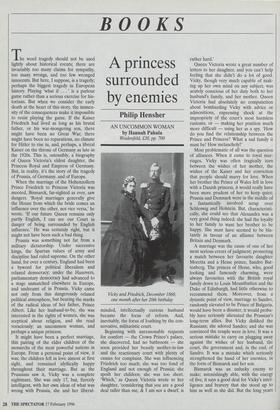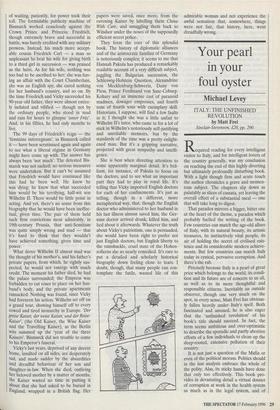BOOKS
A princess surrounded by enemies
Philip Hensher
AN UNCOMMON WOMAN by Hannah Pakula
Weidenfeld, £20, pp. 700
The word tragedy should not be used lightly about historical events; there are invariably too many claims for sympathy, too many wrongs, and too few wronged innocents. But here, I suppose, is a tragedy; perhaps the biggest tragedy in European history. Playing 'what if . . . ' is a parlour game rather, than a serious exercise for his- torians. But when we consider the early death at the heart of this story, the immen- sity of the consequences make it impossible to resist playing the game. If the Kaiser Friedrich had lived as long as his brutal father, or his war-mongering son, there might have been no Great War; there might have been no reparations, no climate for Hitler to rise in, and, perhaps, a liberal Kaiser on the throne of Germany as late as the 1920s. This is, ostensibly, a biography of Queen Victoria's eldest daughter, the Princess Royal and Empress of Germany. But, in reality, it's the story of the tragedy of Prussia, of Germany, and of Europe.
When the marriage of the Hohenzollern Prince Friedrich to Princess Victoria was mooted, Bismarck, far-sighted as ever, saw dangers. 'Royal marriages generally give the House from which the bride comes an influence over the other, not vice versa,' he wrote. 'If our future Queen remains only partly English, I can see our Court in danger of being surrounded by English influence.' He was certainly right, but it might not have been such a bad thing.
Prussia was something not far from a military dictatorship. Under successive kings, the Spartan values of army and discipline had ruled supreme. On the other hand, for over a century, England had been a byword for political liberalism and relaxed democracy; under the Hanovers, parliamentary democracy had advanced to a stage unmatched elsewhere in Europe, and undreamt of in Prussia. Vicky came not only from this dangerously relaxed political atmosphere, but bearing the marks of the radical ideas of her father, Prince Albert. Like her husband-to-be, she was interested in the rights of women, she was sceptical about religion, and she read voraciously; an uncommon woman, and perhaps a unique princess.
It might have been a perfect marriage, this pairing of the elder children of the monarchs of the most powerful nations in Europe. From a personal point of view, it was; the children fell in love almost at first sight, and remained idyllically happy throughout their marriage. But as the Prussians saw it, Vicky was a complete nightmare. She was only 17, but, fiercely intelligent, with her own ideas of what was wrong with Prussia, she and her liberal- Vicky and Friedrich, December 1860, one month after her 20th birthday minded, intellectually curious husband became the focus of reform. And, inevitably, the focus of loathing by the con- servative, militaristic court.
Beginning with unreasonable requests for comfort — the Crown Prince's palace, she discovered, had no bathroom — she soon provided her beastly mother-in-law and the reactionary court with plenty of causes for complaint. She was influencing Friedrich too much; she was too fond of England and not enough of Prussia; she spoilt her children; she was too short. 'Which,' as Queen Victoria wrote to her daughter, 'considering that you are a good deal taller than me, & I am not a dwarf, is rather hard.'
Queen Victoria wrote a great number of letters to her daughter, and you can't help feeling that she didn't do a lot of good. Vicky, though very much capable of mak- ing up her own mind on any subject, was acutely conscious of her duty both to her husband's family, and her mother. Queen Victoria had absolutely no compunction about bombarding Vicky with advice or admonitions, expressing shock at the impropriety of the court's most harmless customs, or — making her position much more difficult — using her as a spy. 'How do you find the relationship between the Prince and Princess? What a sad family it must be! How melancholy!'
Most problematic of all was the question of alliances. When it came to royal mar- riages, Vicky was often tragically torn between the wishes of her mother, the wishes of the Kaiser and her conviction that people should marry for love. When her brother the Prince of Wales fell in love with a Danish princess, it would really have been more prudent of her to keep quiet; Prussia and Denmark were in the middle of a fantastically involved scrap over Schleswig and Holstein. But, characteristi- cally, she could see that Alexandra was a very good thing indeed; she had the loyalty to her family to want her brother to be happy. She must have seemed to be bla- tantly in favour of an alliance between Britain and Denmark.
A marriage was the cause of one of her most serious errors of judgment; promoting a match between her favourite daughter Moretta and a Hesse prince, Sandro Bat- tenberg. The princes of Hesse, who, good looking and famously charming, were always favourites with the British royal family down to Louis Mountbatten and the Duke of Edinburgh, had little otherwise to recommend them. Moreover, from a dynastic point of view, marriage to Sandro, randomly elevated to be Prince of Bulgaria, would have been a disaster; it would proba- bly have seriously alienated the Prussian's long-term allies. But Vicky disliked the Russians; she adored Sandro; and she was convinced the couple were in love. It was a serious mistake to carry on plugging away against the wishes of her husband, the court, the government and, in the end, of Sandro. It was a mistake which seriously strengthened the hand of her enemies, in the form of Bismarck and her son.
Bismarck was an unlucky enemy to make; astonishingly able, with the energy of five, it says a good deal for Vicky's intel- ligence and bravery that she stood up to him as well as she did. But the long years of waiting, patiently, for power took their toll. The formidable publicity machine of Bismarck worked ceaselessly against the Crown Prince and Princess; Friedrich, though extremely brave and successful in battle, was barely credited with any military prowess. Instead, his much more accept- able cousin Friedrich Carl — a man so unpleasant he beat his wife for giving birth to a third girl in succession — was praised as the hero. As for his wife, nothing was too bad to be ascribed to her; she was hav- ing an affair with the Court Chamberlain, she was an English spy, she cared nothing for her husband's country, and so on. By the time Friedrich and Vicky succeeded his 90-year old father, they were almost entire- ly isolated and vilified — though not by the ordinary people, who stood in mud and rain for hours to glimpse 'unser Fritz'. And, in his fifties, he had only months to live.
The 99 days of Friedrich's reign — the 'feminine interregnum', as Bismarck called it — have been scrutinised again and again to see what a liberal regime in Germany might have come up with. The answer has always been 'not much'. The detested Bis- marck was not sacked; no serious measures were undertaken. But it can't be assumed that Friedrich would have continued like this had he been well. He knew he was dying; he knew that what succeeded him would be his terrifying, half-wit son Wilhelm II. There would be little point in acting. And yet, there's no sense from this biography that he would have been ineffec- tual, given time. The pair of them held such firm convictions most admirably, in 19th-century Prussia, that anti-Semitism was quite simply wrong and mad — that it's hard to think that they wouldn't have achieved something, given time and power.
What drove Wilhelm II almost mad was the thought of his mother's, and his father's private papers, from which, he rightly sus- pected, he would not emerge with much credit. The moment his father died, he had the palace surrounded; the Empress was forbidden to cut roses to place on her hus- band's body, and the private apartments ransacked. Nothing was found, since Vicky had foreseen his action. Wilhelm set off on a grand tour, showing himself off to every cowed and tired monarchy in Europe. 'Der greise Kaiser, der weise Kaiser, und der Reise- Kaiser', (the Old Kaiser, the Wise Kaiser and the Travelling Kaiser), as the Berlin wits summed up the 'year of the three Kaisers'. Bismarck did not trouble to come to his Emperor's funeral.
Vicky's last years, deprived of any decent home, insulted on all sides, are desperately sad, and made sadder by the absurdities and dreadful behaviour of her son and daughter-in-law. When she died, outliving her beloved mother by a matter of months, the Kaiser wasted no time in putting it about that she had asked to be buried in England, wrapped in a British flag. Her papers were saved, once more, from the ravening Kaiser by labelling them China With Care, and smuggling them back to Windsor under the noses of the supposedly efficient secret police.
They form the core of this splendid book. The history of diplomatic alliances and of the aristocratic families of Germany is notoriously complex; it seems to me that Hannah Pakula has produced a remarkably readable account of a very difficult subject, juggling the Bulgarian succession, the Schleswig-Holstein Question, Alexandrine von Mecklenburg-Schwerin, Daisy von Pless, Prince Ferdinand von Saxe-Coburg- Kohary and an immense cast of paranoid madmen, dowager empresses, and fourth sons of fourth sons with exemplary skill. Historians, I suppose, will find a few faults in it; I thought she was a little unfair to Wilhelm II's tutor, who came in for a lot of stick in Wilhelm's notoriously self-justifying and unreliable memoirs, but by the standards of the time was a pretty enlight- ened man. But it's a gripping narrative, projected with great sympathy and intelli- gence.
She is best when directing attention to some apparently marginal detail. It's bril- liant, for instance, of Pakula to focus on the doctors, and to see what an important part they had to play in royal life. It's telling that Vicky imported English doctors for each of her confinements. It's just as telling, though in a different, more metaphorical way, that, though the English doctor who administered to her husband in his last illness almost saved him, the Ger- man doctor arrived drunk, killed him, and lied about it afterwards. Whatever the truth about Vicky's patriotism, one is persuaded, she would have been right to prefer not just English doctors, but English liberty to the ramshackle, cruel state of the Hohen- zollerns she so nearly remedied. It's rare to put a detailed and scholarly historical biography down feeling close to tears. I doubt, though, that many people can con- template the futile, wasted life of this admirable woman and not experience the awful sensation that, somewhere, things were not fair, that history, here, went dreadfully wrong.



























































 Previous page
Previous page